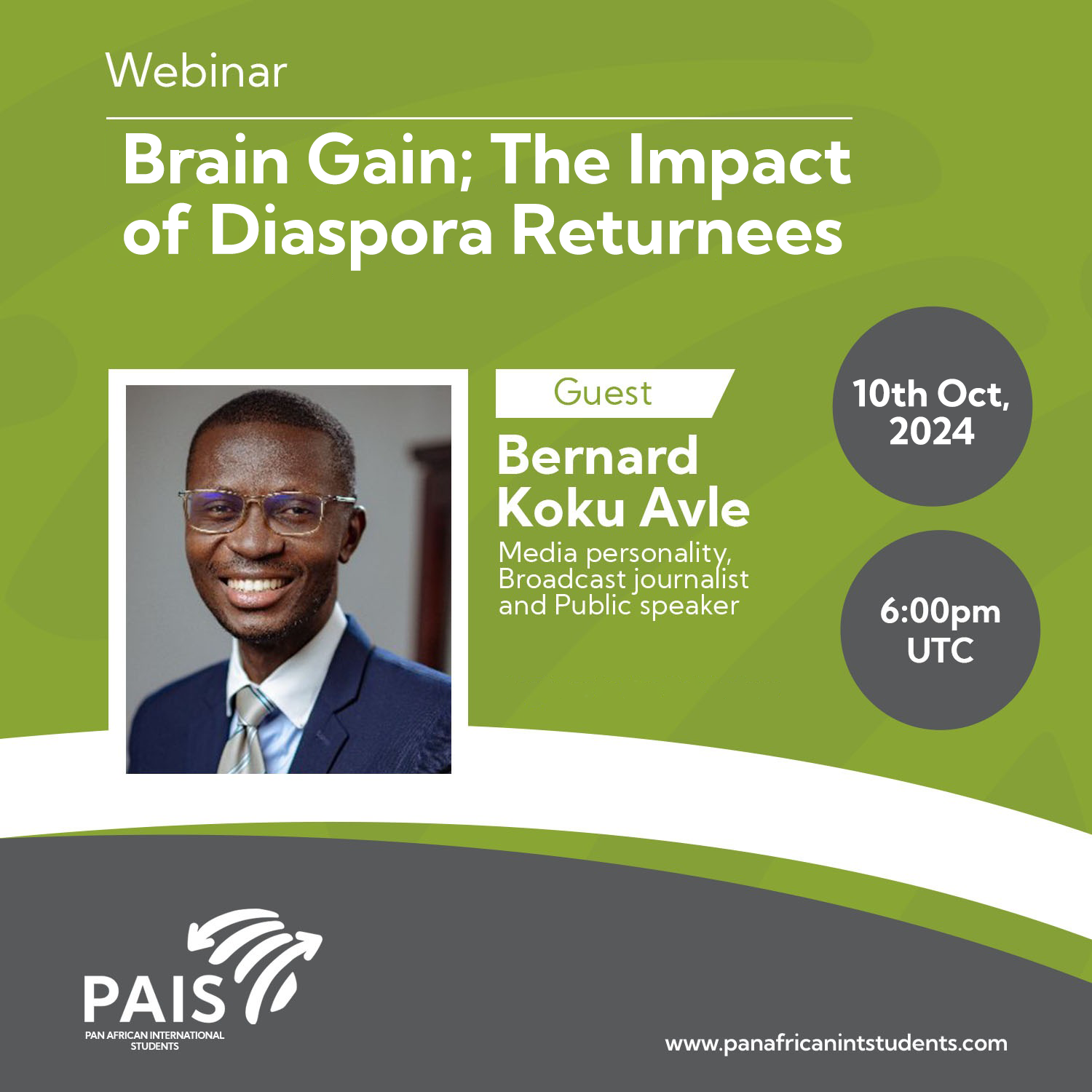On Thursday, October 10, 2024, PAIS Ghana successfully hosted a highly impactful webinar titled “Brain Gain: The Impact of Diaspora Returnees”. The event, which featured renowned media personality and thought leader Mr. Bernard Avle as the special guest speaker, was attended by participants from various African countries, including Rwanda, the Democratic Republic of Congo, Ethiopia, and others. This virtual gathering aimed to explore the significance of the African diaspora in driving development and progress back home, especially in light of the increasing trend of Professionals and students returning to Africa. This trend, known as “reverse migration,” has been observed across sectors such as technology, healthcare, education, and entrepreneurship.
Key Insights from Mr. Avle’s Presentation
Drawing from his personal experiences and professional insights, Mr. Avle explored the dynamics of Africans’ journeys abroad and the essential role diaspora returnees play in shaping Africa’s future. His presentation, rooted in his own life story, challenged listeners to rethink their motivations for leaving Africa, their reasons for returning, and how they can contribute meaningfully upon their return. The heart of his message focused not only on the outward centrifugal journeys, where Africans leave their home countries for various pursuits, but more importantly, on returning to their countries with the aim of making a lasting positive impact.
The Centrifocal Journey: Returning to Africa
Mr. Avle’s central thesis was that the return of Africans from their time abroad is critical to the continent’s progress. While he acknowledged that leaving Africa (the centrifugal journey) is often driven by various factors such as economic hardship, education, or career advancement, his focus remained on the importance of returning home equipped with skills, knowledge, and a sense of purpose.
Mr. Avle’s own return journey from the UK was marked by an intentional desire to contribute to Ghana’s development. After being awarded the prestigious Chevening Scholarship, Mr. Avle pursued an MBA in the UK, expanding his horizons intellectually and professionally. However, his
decision to return to Ghana was never in doubt. For him, the centrifugal journey was always a means to an end—a way to gain the tools necessary to make a meaningful impact upon his return.
He emphasized that diaspora returnees have the potential to bring new perspectives, knowledge, and networks back to Africa, but these contributions are shaped by the why behind their original departure. He urged the audience to reflect deeply on their reasons for leaving, as those reasons will ultimately influence how they reintegrate and contribute upon their return.
Ministry: A Broad Definition of Influence
A key moment in Mr. Avle’s presentation was his discussion of ministry and how his time abroad transformed his understanding of it. Having already opined during his delivery that ministry does not need to be solely about preaching, Mr. Avle defined ministry succinctly in three words: “influencing lives positively.” He explained that ministry, in its broadest sense, is about using one’s gifts, knowledge, and position to impact others for good.
This understanding of ministry was shaped by his experiences both in the UK and back in Ghana. While pursuing his studies, Mr. Avle found himself deeply involved in a small, intimate church led by Pastor John, a Nigerian-born, US-trained engineer who served as his mentor and spiritual guide. It was here, in this close-knit community of about fifteen to twenty members, that Mr. Avle’s view on leadership and ministry evolved. He realized the value of smaller, more focused environments for growth and mentorship. In this setting, Mr. Avle took on roles in Bible studies, the choir, and church visitation, experiences that would later shape his approach to leadership in both the media and ministry sectors.
Upon reflection, Mr. Avle concluded that “small is better” in certain contexts, particularly when it comes to building relationships and discipleship. He drew a contrast between the anonymity of large churches and the personal, intentional mentorship he experienced in the small church in the UK. This experience changed his metrics for success, leading him to value depth of impact over breadth of audience.
The Importance of the ‘Why’
One of the most striking aspects of Mr. Avle’s presentation was his emphasis on the “why” behind a person’s journey, both in leaving Africa and in returning. The motivations for leaving, he argued, play a critical role in shaping one’s experience abroad and, more importantly, their impact upon
returning. For Mr. Avle, his ‘why?’ was clear; he left Ghana to expand his knowledge and enhance his career, with a firm intention to return and use his skills to contribute to his country.
Mr. Avle underscored that the ‘why’ behind leaving Africa shapes decisions about when to leave, where to go, and how to navigate life abroad. Those who leave primarily for economic reasons, for example, may have different experiences and expectations from those who leave for educational or career advancement. Moreover, the ‘why’ influences the resources and networks one develops while abroad, which in turn affect their capacity to contribute upon returning home.
The Role of Global Trends in Africa’s Future
In addition to his personal reflections, Mr. Avle offered a broader perspective on the global context and its implications for Africa. He noted that the world is transitioning from a unipolar system dominated by the United States to a multipolar order where countries like China and Russia as well as the European Union are asserting greater influence. These geopolitical shifts, he argued, have significant implications for Africa, and it is crucial for Africans, both at home and abroad, to stay informed about these developments.
Mr. Avle highlighted that many of the cultural and economic battles taking place globally—such as the rise of social media activism and debates over values—are shaping the future of nations, including those in Africa. He urged diaspora returnees to be aware of these trends as they prepare to reintegrate into their home countries. Understanding the global context, he said, is essential for navigating the complexities of leadership and development in Africa today.
A Call for Focused Discipleship and Mentorship
One of the most profound lessons Mr. Avle took from his time abroad was the importance of mentorship and intentional discipleship. His experience with Pastor John in the UK underscored the value of focused, one-on-one mentorship, where growth is nurtured through personal relationships rather than in large, impersonal settings. Mr. Avle emphasized that this model of leadership—based on personal connection and accountability—can be transformative, both in ministry and in professional settings.
Upon returning to Ghana, Mr. Avle found himself increasingly drawn to smaller, more intimate church settings, where discipleship could flourish. He explained that large churches, while they may offer certain advantages, often lack the personal touch that smaller fellowships can provide. For Mr. Avle, the intentional mentorship he received in the UK was a model for how he wanted to lead and influence others in Ghana. This focused, relational approach to leadership became a core part of his ministry and professional philosophy.
The Importance of Relationships in the Diaspora Experience
Another key theme in Mr. Avle’s presentation was the importance of relationships during the diaspora experience. While studying in the UK, Mr. Avle was part of a diverse cohort of students from across the globe. He formed relationships with classmates from Nigeria, the UK, the US, South America, India, and China. These connections, he explained, were instrumental in broadening his perspective and helping him see the world through multiple lenses.
The relationships Mr. Avle built during his time abroad extended beyond professional networks; they also included spiritual mentorship and personal friendships. Pastor John, for example, played a significant role in Mr. Avle’s spiritual development, helping him to grow in his faith and leadership
abilities. These relationships, Mr. Avle noted, are a vital part of the diaspora experience and can continue to shape one’s life long after returning home.
Conclusion: A Vision for Positive Influence
Mr. Bernard Avle’s presentation at the PAIS Ghana Brain Gain webinar was a powerful call to action for Africans in the diaspora. He urged those living abroad to reflect deeply on their reasons for leaving and to consider how they can use their experiences to contribute meaningfully to their
home countries upon returning. For Mr. Avle, understanding the “why” behind the journey is essential, as it defines both the outward drive to leave and the inward pull to return.
Mr. Avle’s journey—from being mentored in a small church in the UK to leading impactful conversations in Ghana—exemplifies how purposeful, focused leadership can drive lasting change. His message is clear: true ministry, leadership, and influence aren’t defined by scale or visibility but by depth, purpose, and the positive impact we make on others. As Africa rises on the global stage, the role of returning diaspora in shaping the continent’s future will be vital. Mr. Avle’s vision of intentional discipleship and focused leadership lights the way forward.


